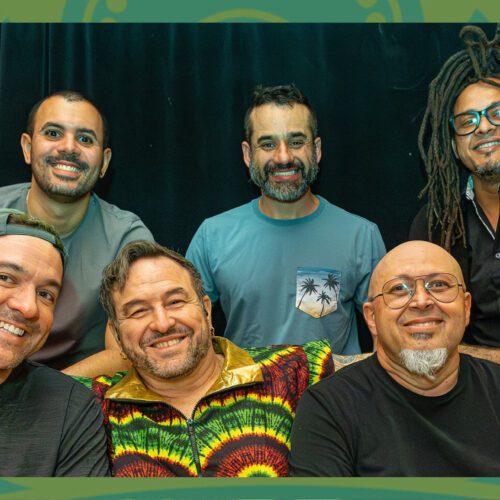Additional Information
Story was originally published in March 2022. Thus Owls plays Suoni Per il Popolo on June 4, 8:30 pm – 11:00 pm / Doors: 8:00 pm at La Sala Rossa, 4848 Boul. Saint-Laurent, Montréal, QC, Canada
Montreal’s highly praised Thus Owls officially released the material for their fifth studio album a few weeks ago. The first concert was scheduled last Thursday, but was postponed because some members caught the variant BA.2. No matter what happened with the virus, here is the interview!
Who Would Hold You If The Sky Betrayed Us is a collaborative project involving three saxophonists: Jason Sharp, Adam Kinner and Claire Devlin join the trio of Erika and Simon Angell and drummer Samuel Joly.
The Angell couple in question on PAN M 360 is one of several highlights of this new project.
PAN M 360: This album is kind of a normal follow-up, but this one is more collaborative. Can you tell me the context of this approach?
SIMON ANGELL: I think all of our albums have been collaborative in some way, to some degree. We like to try to change each time, changing personnel, instrumentation, textures. We’ve always strived for that, and this time we’re leaning more towards our roots as improvisers. In this sense, you want to give your collaborators all the latitude to be themselves, to bring their voice and their expression to our music.
And to do that, you have to make sure that you’re dealing with people that you get along with, that you like, that you communicate well with, musically and in life. And so yes, in that context, the idea came to me to do some arrangements for the saxophone, thinking of Jason, obviously, at first, and then Adam and Claire, who are part of a new generation and creating new sounds.
PAN M 360: We know your high standards. You don’t compromise in creation and you always collaborate with excellent musicians.
SIMON ANGELL: Yes, we always try. For this project, we started a little bit like we always start, which is to go our separate ways first to refine our ideas and then share them with each other, not necessarily together in the same room. In February 2020, our plan was to be at home and compose, you know, in March, April, May. Anyway, We had to take a break from touring and stay home, and we could focus on that. We put together some arrangements, and then we decided what to do with saxophones, so we got in touch with the musicians. In that respect, I feel like luck was really on our side these last two years. We started, not by rehearsing, but by having conversations, zoom meetings, talking about all kinds of things, not only music, getting to know each other, discussing art, philosophy, life. Yes, it’s a good source of inspiration, even if it doesn’t necessarily translate into music.
PAN M 360: Yes, it’s also food for creation.
SIMON ANGELL: Exactly. And it connects people. So we created arrangements for the saxophones, but we left a lot of space in those arrangements for the musicians to interpret them in their own way and also to improvise, to try new things. When we were allowed to go into rehearsal, fortunately it worked out. We were well prepared, I think, but we always try to leave room for improvisation in the recording process. So, on stage, every subsequent performance of these recordings can be different.
PAN M 360: Let’s talk about improvised music, in a context where jazz, the form par excellence of improvised music, is not as popular as it once was. What does improv have to do with Thus Owls?
SIMON ANGELL: Yes, it’s true that jazz doesn’t have the same impact. But we try to maintain the spirit of it in our own way because it’s the form that many of us have studied. Samuel Joly and Jason Sharp are great jazz musicians, for example.
PAN M 360: How do you see this new cycle in relation to the previous ones?
SIMON ANGELL: The fifth album, you know, is a long, hard road, a real challenge to stay true to our instincts, our beliefs, our idea of the creative process. But if you persist over time, you give yourself a chance to succeed. In this sense, we are happy with the position we have reached, with the choices we have made. We are happy where we are.
PAN M 360: You also have an almost ideal configuration: you are a couple, you have started a family, you are creative partners.
SIMON ANGELL: Absolutely. You’re always with the same person, that can be difficult too. And it’s a lot of work for us to do everything to stay independent in our projects.
PAN M 360: Let’s talk about the song and the lyrics. It’s about isolation, about questioning one’s identity. Erika, you’re Swedish and you’ve had to go through a lot as a result, haven’t you?
ERIKA ANGELL: You know, this questioning had already started in my personal life before the pandemic. I’m an immigrant here…after five or six years here, I realized what it did to a person, what it really meant to change culture and territory. There are a lot of these reflections in that title. When you’re ripped out of your own context, and what you learn from that, the good and the bad, the challenges that come with it, with the pandemic on top of that, then it was very obvious that I couldn’t go home, reconnect with the Swedes. I was more isolated than ever, when a normal context was already difficult. So the general theme of the recording is belonging or what it means to belong, or how we think about it through another cultural lens that I don’t always understand personally. Several reflections, exchanges, conversations finally allowed me to express it in the texts of this album.
PAN M 360: How does this is translated into the poetic text?
ERIKA ANGELL: When I write, I write everything in a big messy book, and then I pick and choose and organize the text. Well, I gather words that speak to that belonging, through a relationship, through my 6 year old daughter and my duty as a mother who has to be away, about my relationships scattered across two continents or around the world. I also wrote this during the Black Lives Matter events. I was wondering how to support the cause, how to choose the right way, and how to have the right knowledge to support it properly. It was another way of showing that misunderstandings are common when we try to connect or communicate, and that maybe we need to question ourselves more in order to be in communication and connect with each other. That’s the conversation I talk about throughout the album.
PAN M 360: And the title, Who Would Hold You If The Sky Betrayed Us, perfectly sums up the state of mind. It’s also a gateway to this world that is not just songs, but poetry set to music.
ERIKA ANGELL: I feel like our pieces have always had this structure, they’re parts that follow one another. But I think the lyrics and the way I sing the text may have changed more. But I still like to sing the earlier ones because they are so free. I can still play with those forms and I get a new energy from them every time I perform them. So I wanted to keep that same energy for the composition of the new material, because it makes the live performance much more lively.
PAN M 360: How do you work with text through the creative process?
ERIKA ANGELL: I bring several texts to rehearsals. I sing them, sometimes with a melody, and sometimes I recite them, I do a bit of both. I never write lyrics after a melody, I always write the melody for the text. Because the text comes first. And then I write, I write music and on demand, and I use my lyrics randomly. And they kind of find their way into the material. So yeah, it’s not exactly conservative or orthodox, this writing is an enterprise of my own. I’m trying to find the best relationship between the words and the melody. I also need to be able to say it from my heart. And to do that, any melody that comes, any tension in my expression can be the right one.
PAN M 360: There’s a lot of literature/poetic songs and a lot of music. It’s not totally a song, that’s what’s very, very good… and it also explains why it takes longer for some people to embrace your personal style. But it doesn’t matter, because time will tell that you were right all along.
ERIKA ANGELL: Simon and I make music, it’s for our own well-being but that music has to land somewhere, it has to speak to someone. It’s also about communication in the world. But for me, it’s all about writing the music that I like to listen to. And I’m intrigued by the evolution of texturally rich material that you fall in love with over time. I need to be challenged.























